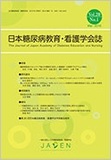Japanese
English
- 販売していません
- Abstract 文献概要
- 参考文献 Reference
- サイト内被引用 Cited by
本研究は,認知機能低下により療養行動が不安定になった高齢糖尿病患者への外来における看護実践プロセスを明らかにすることを目的とし,外来看護師6名の語りを,修正版グラウンデッド・セオリー・アプローチを用いて分析した.
実践は,【認知機能低下の確信プロセス】に始まり,【認知機能低下を来した患者の現状把握】から【支援体制の必要性の認識】に至り【患者の療養行動安定を促進する支援】,【家族の支援役割獲得を促進する支援】に繋がる.その後,患者と家族両者にとっての最善の状態を模索し,同時の【安定の評価】をした後,【認知機能低下の進行の予測とケアの見通し】を持ちケアを継続するプロセスが見出された.実践には常に【ケアの根底にある一貫した方針】が流れていた.【自己の感情の調整】や【安定の意味への問い】に象徴されるように,患者や家族への配慮が迷いとなり,実践に慎重さをもたらしているという特徴が見出された.
The objective of this study was to clarify the process involved in outpatient nursing care of elderly patients with diabetes whose self-care behavior had become impaired owing to decreased cognitive functions. We analyzed the interview responses of 6 nurses at the outpatient department by the modified grounded theory approach.
The process started with “conviction about a patient's decreased cognitive function,” followed by “capture of the current condition of the patient with decreased cognitive function” and “recognition of the necessity for a support system,” and finally arrived at “help the patient exhibit steady self-care behavior” and “support the patient's family members to select their roles of assistance.” This was followed by a process where the best environment for both the patient and the family members was sought; at the same time, following “evaluation of a balanced environment”, care provision was continued with “forecast for progression of the patient's decreased cognitive function status and vision of care provision.” Care was always provided based on a “consistent policy rooted in nursing care.” As indicated by “balancing of self-emotion” and “question about the meaning of steadiness,” the statements of the nurses were characterized by the fact that compassion for a patient and their family members had caused ambivalence and deliberation in practice.
Copyright © 2018, Japan Academy of Diabetes Education and Nursing. All rights reserved.


